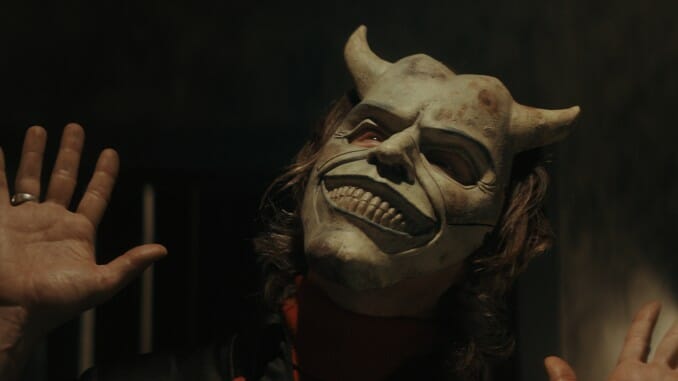Phony and Vulgar, The Black Phone Rings False

At one point late in The Black Phone, a ghostly kid who has been contacting kidnapping victim Finney (Mason Thames) from beyond the grave stops giving him general advice about how to survive, and starts giving him more specific instructions about how to fight back against his captor. The ghost-kid tells young Finney, before running through some rudimentary physical training, to prepare a particular object to serve as a weapon: “Pack it with dirt, give it some heft.” It’s a brief moment, but weirdly indelible for all the wrong reasons. First, it’s deeply strange guidance, because the basement where Finney is trapped also, by this point in the film, has a bunch of broken glass strewn around. But also, “Give it some heft?” Why does this ghost-kid suddenly talk like a pulp character’s corny inner monologue?
These descriptions may sound like spoilers, but The Black Phone is almost too baffling to spoil. The premise sounds simple: In 1978, kids are disappearing from a suburban neighborhood, and the police haven’t made any headway on locating the perpetrator everyone calls The Grabber (played, from behind a creepy modular mask, by Ethan Hawke). When 13-year-old Finney is taken, held in a mostly-empty basement by this obvious maniac, he begins receiving messages from the Grabber’s past victims via a seemingly disconnected black phone. Through the supernatural static of the afterlife, they attempt to coach him through this nightmare. Perhaps even more direct is the movie’s auxiliary premise: Finney’s sister Gwen (Madeleine McGraw) sees glimpses of the abductions in her dreams, and is desperate to use these visions to help her brother. But she’s discouraged from using her powers by her drunken, abusive father (Jeremy Davies), who remembers how his late wife was tortured by similar abilities.
Why the movie has two premises remains a mystery for the ages. Technically, it’s easy enough to trace the horror-yarn lineage: Writer/director Scott Derrickson and co-writer C. Robert Cargill (who previously worked with Hawke on the creepy Sinister) adapt a short story by Joe Hill—the son of Stephen King, whose work both premises recalls. The film has been painted in dark, saturated tones by cinematographer Brett Jutkiewicz (who also has horror experience, shooting Ready or Not and the most recent Scream), presumably aiming for something grittier and gnarlier than the comparably sunnier throwback of Stranger Things (which Jutkiewicz has also worked on).
-

-

-

-

-

-

-

-

-

-

-

-

-

-

-

-

-

-

-

-

-

-

-

-

-

-

-

-

-

-

-

-

-

-

-

-

-

-

-

-








































